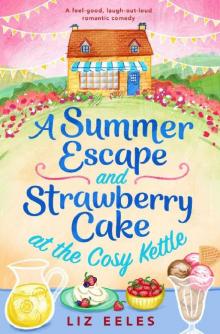A Summer Escape and Strawberry Cake at the Cosy Kettle: A feel good, laugh out loud romantic comedy Read online
A Summer Escape and Strawberry Cake at the Cosy Kettle
A feel-good, laugh-out-loud romantic comedy
Liz Eeles
Books by Liz Eeles
The Cosy Kettle series
New Starts and Cherry Tarts at the Cosy Kettle
A Summer Escape and Strawberry Cake at the Cosy Kettle
The Salt Bay series
Annie’s Holiday by the Sea
Annie’s Christmas by the Sea
Annie’s Summer by the Sea
Contents
Chapter 1
Chapter 2
Chapter 3
Chapter 4
Chapter 5
Chapter 6
Chapter 7
Chapter 8
Chapter 9
Chapter 10
Chapter 11
Chapter 12
Chapter 13
Chapter 14
Chapter 15
Chapter 16
Chapter 17
Chapter 18
Chapter 19
Chapter 20
Chapter 21
Chapter 22
Chapter 23
Chapter 24
Chapter 25
New Starts and Cherry Tarts at the Cosy Kettle
Hear More from Liz
Books by Liz Eeles
A Letter from Liz
Annie’s Holiday by the Sea
Annie's Christmas by the Sea
Annie’s Summer by the Sea
Acknowledgements
For Suzie, a true northern goddess
Chapter One
I love it when The Cosy Kettle is busy. There’s something about the soft hiss of the coffee machine amid the gentle buzz of conversation that hits me right in the heart – which is surprising for a fairly unsentimental person like me.
But nothing beats being alone in the café at the end of the day, when the coffee machine has fallen silent and rays of golden summer sunshine are slanting across the whitewashed walls. I look around me, at the tables with their pretty pink cloths and the strands of colourful bunting looping from the ceiling, and smile. This place has changed so much in such a short time.
Only a few months ago, where I’m standing was a dingy storeroom in the back of a small-town bookshop. And now it’s a warm and welcoming space, decorated with paintings by local artists and a shelf of gleaming copper kettles. It’s been transformed – rather like me. Though my transformation from unambitious forty-something wife to confident small-business owner is still a work in progress.
I pull the door of the café closed, walk through the bookshop and step outside onto Honeyford High Street. June sunshine is turning the Cotswold stone around me a glowing butter-yellow and I’m struck again by the town’s beauty. I noticed it the first time I came here, just before I took on the bookshop. And the tiny stone cottages and grander gabled buildings, with hills rising behind them, still take my breath away.
Talking of which… after locking the door of the shop and pocketing the key, I tentatively sniff. Country air is invigorating. Usually. Unless the wind is in the wrong direction and the sickly sweet scent of manure is wafting off the hills. It makes me wince but the locals don’t seem to notice the occasional pong that drifts through the town.
I mentioned the smell once to eighty-year-old Stanley, who’s a regular Cosy Kettle customer. But he laughed and accused me of being ‘a namby-pamby city girl’. So now I just suck it up – so to speak – and trust that my olfactory cells will soon become blunted. Stanley’s are obviously long dead after being exposed to eight decades of countryside aromas.
Fortunately, this afternoon’s air carries nothing more than pollen and a hint of honeysuckle. So I take a long, deep breath before walking past the stone arches of the market house, towards my car.
Tourists are wandering nearby, with their camera phones pointed at the ancient buildings that line the High Street, and I wonder if they assume I’m a local who belongs here. Or if they also see a namby-pamby city girl who’s trying to fit in?
‘Excuse me, ma’am,’ says a stout man in baggy shorts, in a drawling American accent, ‘I’m Ted and this lady is my wife, Linda. Would you mind taking a photo of us together, right here?’ He points at a brass plaque, on the front of the Pheasant and Fox pub, which reads: Sixteenth-century coaching inn, once visited by Oscar Wilde. The plaque is almost obscured by purple verbena cascading from a huge hanging basket, and Ted gently pushes flowers out of the way before handing me his phone.
‘Of course I don’t mind.’ I put my shoulder bag down on the pavement and snap several pictures as he and his wife point at the plaque with toothy grins. ‘Hopefully at least one of those will be OK.’
‘Thank you,’ says Ted, taking back his phone and nodding as he scrolls through the photos. ‘Good job! These will be a perfect memento of our visit. You’re so lucky to live here, in such a truly special place.’
I don’t actually live here. My home is a two-bedroom flat above my husband’s restaurant in Oxford. But I don’t let on as Ted and Linda wave and wander off.
I walk on, chuffed that Ted and Linda assumed I belonged in Honeyford – right up until I catch sight of myself reflected in a shop window. Nope, I still look like a namby-pamby city girl to me.
Callie, Stanley’s granddaughter who helped me set up the café, always looks effortlessly casual and at ease with herself. But I rarely seem to get it right. Today, my fitted green dress and matching jade shoes look over the top for a small country bookshop and café – as though I’m trying too hard to be the boss and to convince myself that I know what I’m doing.
Ah, well. I push my sunglasses up my nose and run a hand through my dark shoulder-length hair.
The good news is that business has picked up since we opened The Cosy Kettle at the back of the shop. Even Malcolm, my often-critical husband, has grudgingly admitted that maybe me taking on the shop wasn’t quite such a disastrous idea after all. At first he warned me the shop was a mistake, over and over again, before I decided to plough the money left to me by my parents into this ‘business opportunity’. That’s what the agent called it: ‘an amazing business opportunity that rarely becomes available’. Malcolm called it ‘a big black money pit that no one in their right mind would touch with a bargepole’.
I think that was when I decided to go for it.
I love Malcolm, I admire his ambition, and I’ve always supported his restaurant ventures, even when he’s overstretched himself and they’ve gone slightly tits up. But now I’m over forty myself, I’ve been feeling little tremors of… something. Panic? Boredom? Rebellion? Possibly. Or maybe it’s just my own ambition scrabbling hard to get out.
Whatever the reason, those tremors pushed me to swallow my fear and become a bookshop owner. And things will work out because, quite frankly, I couldn’t bear asking Malcolm to bail me out. He’s a good man and we’ve been married pretty happily for over twenty years. But he does have a tendency to say ‘I told you so’.
To be honest, I feel proud of myself for taking a chance on Honeyford Bookshop and The Cosy Kettle. I’ve found out what customers want and ordered in a wide array of books and, though it’s been tough at times, it’s been fun. I’d never say this to Malcolm because he wouldn’t understand, but I’ve felt more alive over the last few months than I have done for ages. And that’s why I’m determined to do all I can to become a proper part of this close-knit community. Even if I have to toil long hours, wear jeans to work a
nd suppress my sense of smell forever.
My car, parked next to the war memorial, is like an oven when I open the door. The sun has been beating down on it all day, the steering wheel is baking hot when I slide into the driver’s seat – and the whole vehicle smells of cheese. What is it with Honeyford and eye-watering whiffs?
When a quick search reveals Malcolm’s ripe trainers under the passenger seat, I wrap them in a carrier bag and dump them in the boot. He must have left them in my car after I picked him up from the gym a couple of days ago. Though quite why he’s suddenly started weight training after years of avoiding any exercise is a mystery.
I did wonder if he was having a midlife crisis but he assured me everything was fine when I gently asked him about it. Then he went off on one about some bloke at the gym who hogs the running machine, so I changed the subject. But maybe it’s something I need to keep an eye on, I think, as I pull out into Weavers Lane and head for Oxford.
The journey takes less time than usual because the traffic’s not too bad when I get to the city outskirts. And when I reach our restaurant, The Briar Patch, I spot a perfect space for my car nearby. The gods of city centre parking are smiling on me this afternoon.
The back door of the restaurant is propped open with a crate of potatoes to let a breeze into the steamy kitchen, so I walk straight in.
The first thing that strikes me as odd is the low-pitched giggling. It sounds like Malcolm – but Malcolm doesn’t giggle. He sniggers at jokes sometimes, and does the occasional snort when something funny takes him by surprise. Coffee came down his nose once when he was watching Michael McIntyre. And he’s been known to guffaw – usually at reruns of ancient sitcoms.
But in all the years we’ve been married. I’ve never once heard him giggle.
The second thing that strikes me as odd is that the sound is coming from the restaurant’s cold store – a small room that houses meat, fruit and veg. I start walking more quickly. Maybe Malcolm’s accidentally shut himself in and the giggle is really a strangled gasp from my frozen husband? Maybe he’s been trapped in there for hours and is dying of hypothermia?
That’s strange; the door is ajar. I wrench it open, bowl into the room, and stop short.
Malcolm is not dead. At least, not yet.
My husband is in what can only be described as ‘a clinch’ with a petite blonde whose corkscrew curls are winding down her back. His hand is resting on her pert backside and his mouth is open so wide he looks like he’s eating her face.
This is something I’ll never be able to unsee. The image sears onto my brain as my familiar, contented life shatters into a million pieces, like china hitting concrete.
‘What the hell is going on?’ I gasp.
Malcolm has come up for air. He wipes his hand across the back of his mouth, which is red with transferred lipstick, and his grey eyes open wide with alarm when he spots me.
‘What are you doing here? You don’t usually get home this early,’ he splutters as though it’s my fault that my world is currently crashing down around my ears.
I don’t do or say anything. I can’t because my body seems to have suddenly seized up. And my shallow breaths hang white in the chilly air as I push down a rising feeling of panic. This can’t be happening. Not to me and Malcolm. We’re an ordinary married couple, living an ordinary life. We have our ups and downs – who doesn’t? But we love each other. Don’t we?
The woman rests her forehead against his chest for a moment before turning around. But I already know who she is. Marina works here at The Briar Patch as a waitress. She’s young enough to be Malcolm’s daughter – far younger than me, and skinnier, with long legs, big blue eyes, and lips that look like someone’s taken a bicycle pump to them.
I’m so stupid! I should have guessed.
Images from the past few weeks start running through my head. Marina’s hand brushing Malcolm’s leg; the two of them, heads bent together, sorting out food orders. She even laughs at his terrible jokes, for goodness’ sake. It was obvious!
But I didn’t see it because I trusted Malcolm and thought he loved me.
‘Flora, I’m sorry you saw me and Malcy – us – like this,’ says Marina, her cheeks flaming against her white-blonde hair.
Malcy? No one calls my husband Malcy. He’d throw a fit if I called him Malcy. And are they really an ‘us’? We’re an ‘us’ – me and Malcolm. How can my husband be an ‘us’ with someone else?
‘Marina, you’d better go and make sure the menus are on the tables,’ says ‘Malcy’. He glances nervously at a row of meat cleavers hanging on the wall beside me, as though I might suddenly lose control.
She pouts at him. ‘Really, Malcy? Do you want me to leave?’
When my husband nods, she wrinkles her pert nose, picks up a bunch of purple freesias that are on the floor at her feet, and brushes past me in a cloud of overpowering perfume. The heavy door bangs behind her and I hear the dull, disappearing clip of her high heels.
Malcolm and I stare at each other as a hanging animal carcass swings back and forth between us. It’s not the most romantic of locations but then Malcolm has never been a romantic man – something I should have realised when he proposed over a takeaway vindaloo. To a sheltered eighteen-year-old with parents who considered spaghetti bolognaise to be foreign and adventurous, it all seemed rather exotic at the time.
‘We can’t talk in here,’ says Malcolm. He strides towards me and grabs my hand, but I snatch it back.
‘So it’s OK for you to snog your staff in here but you can’t have a conversation with your wife?’
I haven’t used the word ‘snog’ since I was a teenager, and my voice sounds shrill and high-pitched. I don’t sound like me at all.
‘Not so loud, Flora. You’ll embarrass yourself,’ says Malcolm, almost pushing me out of the door. Freddie, who’s in the corner of the kitchen prepping the veg, glances up before going back to chopping carrots into tiny orange batons.
How much does Freddie know? How much do all the staff know? Am I the butt of bawdy in-jokes or pitied as the wronged wife? I expect they’ve all been discussing me: ‘Poor old Flora. Her husband is fooling around with younger women and she doesn’t have a clue.’
Is it women plural or just nubile, oestrogen-soaked Marina with her stupid corkscrew hair?
Malcolm grabs my arm and pulls me out of the kitchen and through the restaurant which will be opening in half an hour. Marina is in the corner, near the bar, polishing glasses in a frenzy. She carries on scrubbing the spotless crystal and doesn’t look up as we rush past the tables and start climbing the stairs to our flat.
Living above the ‘shop’ isn’t ideal. Our home has a lingering smell of fried onions and fish wafting up from the kitchen below. But being so close to his business means Malcolm doesn’t have far to stagger to bed when the restaurant closes, and I can help out in the evenings, even when I’m knackered after a day in my bookshop and café.
Malcolm slams the door to the flat behind us and pushes past me. ‘I think I need a drink,’ he announces, heading for the kitchen.
I wander into our light, bright living room, feeling dazed, and perch on the windowsill. Below me, in the narrow street, shoppers are scurrying along in shirtsleeves and I spot the blue of the river in the distance. Students are wandering along arm in arm and there’s a buzz of conversation from people sitting outside a nearby café. How can everything around me look the same when my life is suddenly so different? I take a deep breath, close my eyes and rest my forehead against the cool window as pain and sorrow threaten to overwhelm me. What happens to Flora Morgan now? A frisson of fear stirs in my soul.
‘Here you go, you’d better drink this.’ As Malcolm shoves a glass at me, liquid slops onto my dress and soaks through to my skin.
Good grief, it’s a large glass and it’s filled to the brim with – I give it a sniff – gin. He may as well have given me the bottle with a straw. I carefully place the drink on the painted white windowsill, untouched.<
br />
‘Go on then. Say it!’ says Malcolm, gruffly, pacing up and down the rug we bought together in Habitat.
My husband is sweating. Usually he takes great pride in his appearance and is immaculately turned out. But damp patches are spreading under the arms of his blue cotton shirt. He stops pacing and stares at me while I try to put my feelings into words.
‘How long has this been going on?’ I manage, eventually. I must sound like every wronged wife in the history of infidelity.
‘How long has what been going on?’
‘Your affair with Marina, obviously. Stop treating me like an idiot, Malcolm.’
‘I wouldn’t call it an affair. That’s a very loaded word.’
‘What would you call it then?’
Malcolm blinks rapidly. ‘I don’t know. It’s just a… a dalliance.’
‘A dalliance?’ My laugh sounds hollow. ‘So did you dalliance Marina into bed?’
‘Now you’re just being ridiculous,’ puffs Malcolm, knocking back a slug of whisky from his brimming tumbler, and avoiding answering the question.
When he steps closer to the window, I notice that the subtle stripes of grey at his temples have disappeared. He must have dyed his hair! No wonder two of my best white towels have mysteriously disappeared and he’d cleaned the bathroom when I got home a few nights ago. I was so pleased at the time – I thought he was coming round to the idea of the bookshop and trying to be helpful. But it turns out he was just covering his tracks.

 Secrets at the Last House Before the Sea
Secrets at the Last House Before the Sea A Christmas Wish and a Cranberry Kiss at the Cosy Kettle: A heartwarming, feel good romance
A Christmas Wish and a Cranberry Kiss at the Cosy Kettle: A heartwarming, feel good romance A Summer Escape and Strawberry Cake at the Cosy Kettle: A feel good, laugh out loud romantic comedy
A Summer Escape and Strawberry Cake at the Cosy Kettle: A feel good, laugh out loud romantic comedy Annie’s Summer by the Sea: The perfect laugh-out-loud romantic comedy
Annie’s Summer by the Sea: The perfect laugh-out-loud romantic comedy Annie's Lovely Choir By The Sea
Annie's Lovely Choir By The Sea